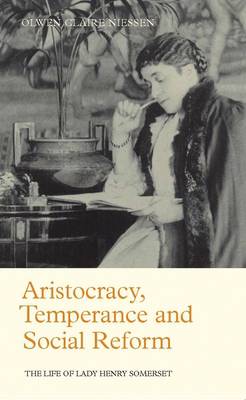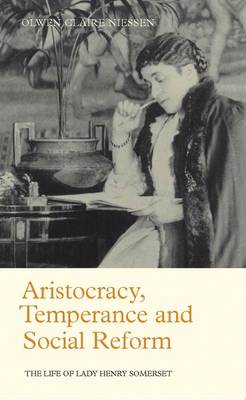
- Retrait gratuit dans votre magasin Club
- 7.000.000 titres dans notre catalogue
- Payer en toute sécurité
- Toujours un magasin près de chez vous
- Retrait gratuit dans votre magasin Club
- 7.000.0000 titres dans notre catalogue
- Payer en toute sécurité
- Toujours un magasin près de chez vous
Aristocracy, Temperance and Social Reform
The Life of Lady Henry Somerset
Olwen Claire Niessen
Livre broché | Anglais
76,45 €
+ 152 points
Format
Description
The visionary achievements of Isabella (Isabel) Caroline Somerset, like the temperance cause she led, have undeservedly faded into obscurity. By her contemporaries she was feted for her social activism, and at the time of her death in 1921, Isabel Somerset's vigorous reform efforts were internationally recognised and acclaimed by humanitarian, political and social-reform organisations and the labour movement.
Beginning with local temperance and philanthropic work, Isabel Somerset progressed to become president of the British Women's Temperance Association, which she gradually transformed from a single-issue organisation into one committed to women's rights and a broad range of social initiatives; the BWTA became a potent pressure-group force in the politically influential, late-nineteenth-century temperance movement.
Discouraged by the existing punitive, futile methods used to combat alcoholism, she founded a farm colony for female inebriates and employed a pioneering rehabilitation programme based upon therapeutic treatment and life-style changes. Through her close co-operation with American temperance icon Frances Willard, Isabel Somerset strengthened the bonds between the Anglo-American and international temperance and women's movements. Isabel Somerset's activism did not go unchallenged. In 1893 she successfully overcame the BWTA social conservatives' attempts to unseat her, and thereafter expanded the membership to hitherto unprecedented levels. In 1897-8 her position on state-regulated prostitution in India created a controversy which reverberated beyond the Association to encompass its sister organizations and proved temporarily detrimental to Somerset's reputation and credibility. Isabel survived this disputation, retaining her presidency and succeeding Willard as president of the World's Woman's Christian Temperance Union following her death in 1898.
Isabel Somerset was a devout Christian, compassionate humanitarian, temperance activist, committed social reformer and women's rights campaigner, a charismatic leader and eloquent orator. Her roles of reformer and women's advocate, as revealed anew in the pages of this biography, place her in the pantheon of notable Victorian female reformers.
Beginning with local temperance and philanthropic work, Isabel Somerset progressed to become president of the British Women's Temperance Association, which she gradually transformed from a single-issue organisation into one committed to women's rights and a broad range of social initiatives; the BWTA became a potent pressure-group force in the politically influential, late-nineteenth-century temperance movement.
Discouraged by the existing punitive, futile methods used to combat alcoholism, she founded a farm colony for female inebriates and employed a pioneering rehabilitation programme based upon therapeutic treatment and life-style changes. Through her close co-operation with American temperance icon Frances Willard, Isabel Somerset strengthened the bonds between the Anglo-American and international temperance and women's movements. Isabel Somerset's activism did not go unchallenged. In 1893 she successfully overcame the BWTA social conservatives' attempts to unseat her, and thereafter expanded the membership to hitherto unprecedented levels. In 1897-8 her position on state-regulated prostitution in India created a controversy which reverberated beyond the Association to encompass its sister organizations and proved temporarily detrimental to Somerset's reputation and credibility. Isabel survived this disputation, retaining her presidency and succeeding Willard as president of the World's Woman's Christian Temperance Union following her death in 1898.
Isabel Somerset was a devout Christian, compassionate humanitarian, temperance activist, committed social reformer and women's rights campaigner, a charismatic leader and eloquent orator. Her roles of reformer and women's advocate, as revealed anew in the pages of this biography, place her in the pantheon of notable Victorian female reformers.
Spécifications
Parties prenantes
- Auteur(s) :
- Editeur:
Contenu
- Nombre de pages :
- 320
- Langue:
- Anglais
Caractéristiques
- EAN:
- 9781350172586
- Date de parution :
- 23-07-20
- Format:
- Livre broché
- Format numérique:
- Trade paperback (VS)
- Dimensions :
- 140 mm x 216 mm
- Poids :
- 371 g

Les avis
Nous publions uniquement les avis qui respectent les conditions requises. Consultez nos conditions pour les avis.






